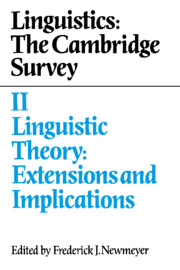Book contents
- Frontmatter
- Contents
- Contributors
- Preface
- 1 Extensions and implications of linguistic theory: an overview
- 2 Grammar and language processing
- 3 Grammatical principles of first language acquisition: theory and evidence
- 4 Second language acquisition and grammatical theory
- 5 Brain structures and linguistic capacity
- 6 Abnormal language acquisition and the modularity of language
- 7 Grammatical aspects of speech errors
- 8 Grammar and conversational principles
- 9 Discourse analysis: a part of the study of linguistic competence
- 10 Speech act distinctions in grammar
- 11 Computer applications of linguistic theory
- 12 Metrics and phonological theory
- 13 Grammatical theory and signed languages
- 14 The linguistic status of creole languages: two perspectives
- 14.I Creole languages and the bioprogram
- 14.II Are creoles a special type of language?
- 14.III A dialog concerning the linguistic status of creole languages
- Subject index
- Name index
- Contents of volumes I, III, and IV
1 - Extensions and implications of linguistic theory: an overview
Published online by Cambridge University Press: 08 February 2010
- Frontmatter
- Contents
- Contributors
- Preface
- 1 Extensions and implications of linguistic theory: an overview
- 2 Grammar and language processing
- 3 Grammatical principles of first language acquisition: theory and evidence
- 4 Second language acquisition and grammatical theory
- 5 Brain structures and linguistic capacity
- 6 Abnormal language acquisition and the modularity of language
- 7 Grammatical aspects of speech errors
- 8 Grammar and conversational principles
- 9 Discourse analysis: a part of the study of linguistic competence
- 10 Speech act distinctions in grammar
- 11 Computer applications of linguistic theory
- 12 Metrics and phonological theory
- 13 Grammatical theory and signed languages
- 14 The linguistic status of creole languages: two perspectives
- 14.I Creole languages and the bioprogram
- 14.II Are creoles a special type of language?
- 14.III A dialog concerning the linguistic status of creole languages
- Subject index
- Name index
- Contents of volumes I, III, and IV
Summary
Noam Chomsky's Syntactic structures (1957), which introduced the theory of transformational generative grammar, did not suggest any possible extensions of the theory or point to any of its broader implications. As Chomsky wrote later, he felt that it would have been ‘too audacious’ for him at that time to have raised the ‘psychological analogue’ to the problem of constructing a linguistic theory (1975:35). But Robert B. Lees, in a review that appeared simultaneously, did not shrink from this task. He closed the review with a frontal attack on the predominant behaviorist learning theory, arguing that the complexity and abstractness of natural language grammars leads irrevocably to the conclusion that they must literally be ‘in the head’ of the speaker. But if so, he asked, then how could they possibly be learned inductively? ‘It would seem,’ he concluded, ‘that our notions of human learning are due for some considerable sophistication’ (1957:408).
It was Chomsky's 1959 review of B. F. Skinner's Verbal behavior that drove home the fact that his theory of language, far from being a mere clever manipulation of arcane symbols, was a psychological model of an aspect of human knowledge. Chomsky's review represents, even after the passage of almost 30 years, the basic refutation of behaviorist psychology. The review takes in turn each basic construct of behaviorism, and concludes that ‘a critical account of his book must show that… with a literal reading … the book covers almost no aspect of linguistic behavior, and that with a metaphoric reading, it is no more scientific than the traditional approaches to this subject matter, and rarely as clear and careful’ (Chomsky 1959:31).
- Type
- Chapter
- Information
- Linguistics: The Cambridge Survey , pp. 1 - 14Publisher: Cambridge University PressPrint publication year: 1988
- 2
- Cited by



